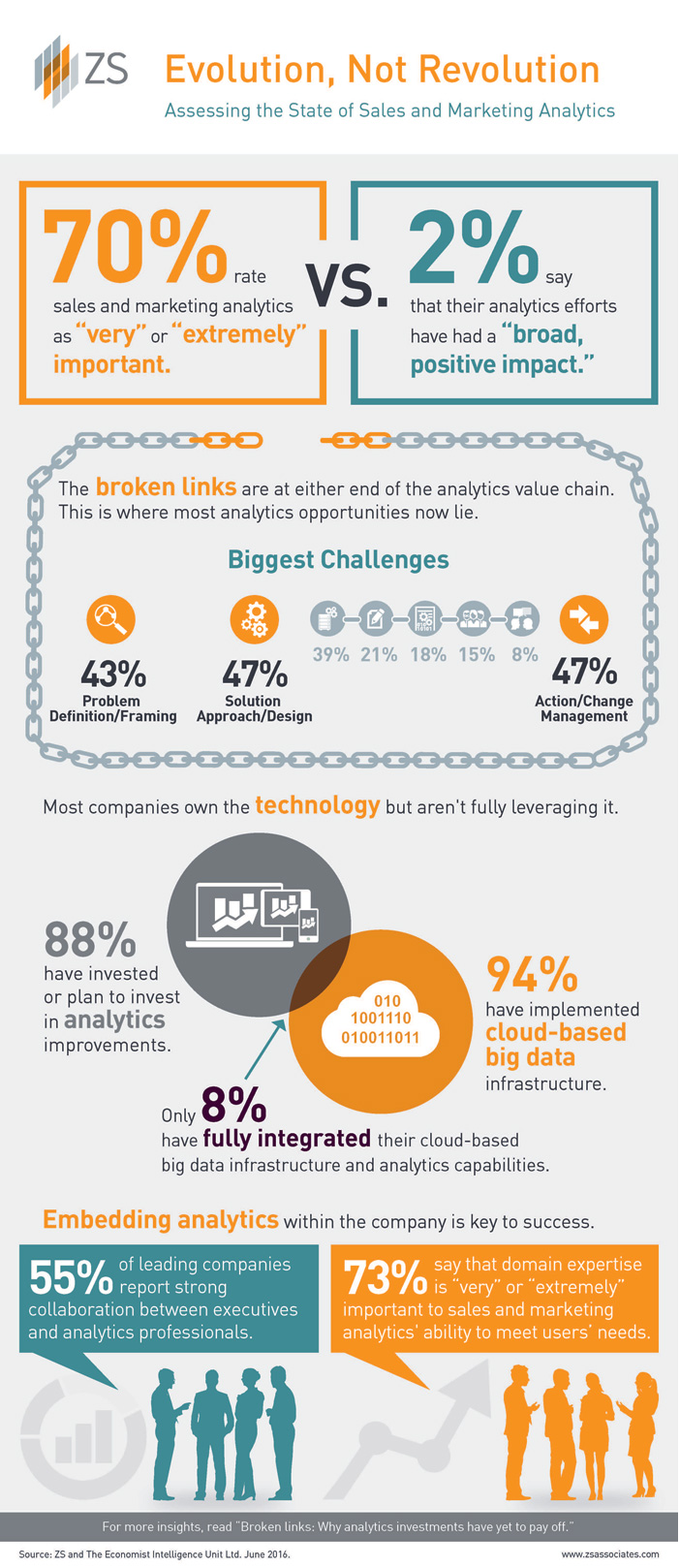
Companies Struggle to Find an ROI on Analytics

Executives across every industry are looking to big data analytics for a competitive advantage. But all too often, analytic investments fail to deliver the goods as promised, according to a recent survey of return on investment (ROI) of sales and marketing analytics.
Last month, ZS Associates released the results of a study of about 450 senior sales and marketing executives for U.S. companies. The study, which was conducted by the Economist Intelligence Unit, found that, while 70 percent of respondents find analytics is either “very” or “extremely important” to their own business, only 2 percent say the analytics have resulted in “broad, positive impact.”
“While nearly all companies invest in analytics, few organizations are getting it right and generating meaningful business impact,” said Dan Wetherill, an associate principal on ZS’s Analytics Process Optimization (APO) team and leader of this study.
The study, called “Broken links: Why analytics investments have yet to pay off,” reflected the analytic perspectives of executives in financial services, healthcare, pharmaceuticals, travel, transportation, IT, and telecommunications. While the study cast a wide net across multiple industries, it focused on a somewhat narrow aspect of analytics pertaining only to sales and marketing.
(For more details about what the study found–and what areas of analytics are the source of the “broken links”–see the infographic at the end of this story.)
Other studies have found more widespread success with analytics. In its “Betting on Big Data” study released last September, Teradata (NYSE: TDC) reported that about two-thirds of companies reported solid results from their investments, while about one-third had yet to find a satisfactory return on their investment in analytics.
However, even in the Teradata study, the average return gained from analytic investment was on the order of 1 to 3 percent. Those may not be the type of earth-shaking numbers that one would expect from a technology that receives so much attention. But the Teradata numbers do reflect the fact that most of the companies involved with the study were large corporations, where even small fractions can translate into big dollars.
One common theme found across both the ZS Associates study and the Teradata study was the need to embed analytic thinking into the company and to make analytic processes just a daily part of doing business.
“Our study indicates that strong collaboration between executives and analytics professionals and a willingness to embed analytics processes more closely into the fabric of the business can help companies increase customer engagement and profits,” ZS Associates’ Wetherill says.
Cloud-based analytic services already dominate in sales and marketing analytics. According to the survey, more than 90 percent of comapines have invested in cloud-based big data infrastructure or are planning to do so. However, only 8 percent have integrated it into their overall analytics, the survey found.
Big data analytics is well on its way to becoming a ubiquitous part of doing business. The market for tools and services is expanding rapidly, and some well-publicized analytic gains have whet the appetites of executives who would like to replicate them at their shops.
But despite the hype and the promise surrounding big data analytics, getting analytics right isn’t easy, and requires a lot of dedication, focus, and hard work.
“As our research illustrates, there’s been substantial progress on the technology side of sales and marketing analytics,” said Gilda Stahl, the EIU’s managing editor of content solutions. “On the business side, however—i.e., making sure the organization actually uses and benefits from this capability—companies are still struggling. Those who get it right in the near future will have an important competitive advantage.”

(Source: ZS Associates)
Related Items:
Healthcare Struggling to Realize Big Data ROI






























